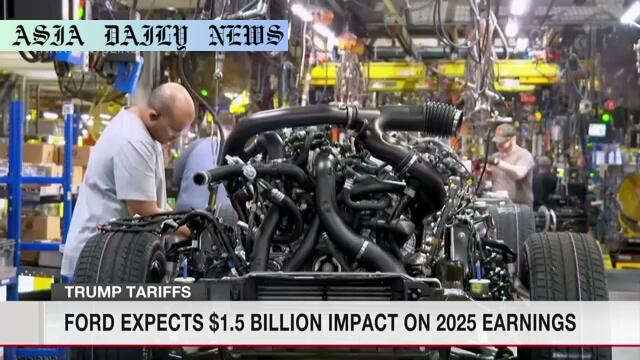Tariffs – Ford is poised for a $1.5 billion earnings hit as officials cite industry risks, tariff costs, and supply chain issues.
Ford braces for a $1.5 billion decline in EBIT following Trump tariffs.
Officials anticipate $2.5 billion additional costs due to levies.
General Motors also reduces its earnings outlook amidst industry concerns.
Supply chain disruptions and retaliatory policies add to Ford’s challenges.

Overview of Ford’s Financial Challenges
Ford Motor Company, a cornerstone of the United States’ automotive industry, is grappling with profound financial repercussions stemming from the tariffs imposed by former President Donald Trump. These tariffs, targeting imported automobiles and parts, have created a ripple effect across the industry. As a result, Ford officials project that the company’s earnings before interest and taxes (EBIT) for the year will take a $1.5 billion hit. Additionally, with increased material and supply chain costs, the automaker anticipates an added $2.5 billion in expenses. These combined challenges pose a significant threat to its already volatile financial stability, marking a daunting period for the organization.
Impact Analysis of Tariffs on the Automotive Industry
Tariffs, designed to protect domestic industries, can sometimes backfire, especially in globally interconnected markets like the automotive sector. Ford’s predicament exemplifies how increased costs on imported parts directly impact domestic manufacturers. While Ford assembles over 75 percent of its vehicles domestically, it still relies on global supply chains for components. The sudden surge in costs has forced the company to retract its previous full-year financial outlook, signifying the growing uncertainty in its operational strategies. Experts observe that these tariffs, coupled with potential retaliatory actions by trade partners, are creating not only financial strain but also significant operational challenges for automakers like Ford and General Motors, which has also downgraded its earnings expectations.
Concerns of Supply Chain Disruptions
One major consequence of the tariff imposition is the disruption of supply chains. Efficient supply chains are the backbone of industries like automotive manufacturing, where parts often travel across borders multiple times before final assembly. With the newly imposed tariffs, logistics costs have risen dramatically. Ford, which depends on intricate networks of suppliers, has expressed concerns over disruptions that could lead to production delays. Industry analysts highlight that such disruptions could derail production schedules, inflate transportation costs, and impact sales. Furthermore, this uncertainty underscores the vulnerability of globalized supply chains to abrupt policy changes.
Substantial Industry Risks and Broader Economic Implications
Ford’s outlook highlights broader concerns within the automotive sector as a whole. As a leading industry player, its projections serve as a harbinger for smaller automakers and suppliers that might lack the resilience to absorb such cost increases. The $2.5 billion estimated tariff-related expenses foreshadow a chain reaction, potentially leading to rising vehicle prices, reduced consumer demand, and shrinking profit margins. Compounding the challenges, Ford warns of other substantial industry risks, such as evolving regulatory policies and global economic dynamics. Such shifts could stagnate recovery efforts, with adverse effects spilling over into job markets and regional economies dependent on car manufacturing hubs.
A Call for Strategic Resilience
To weather this financial storm, Ford and its industry peers must recalibrate their strategies to incorporate adaptive measures. Diversifying supply chains, exploring new markets, and investing in automation could provide cost efficiencies. Additionally, collaboration with policymakers for more favorable trade agreements might help mitigate future disruptions. However, any major pivot requires significant time and investment, which are in short supply during such turbulent periods. In this context, how Ford can balance immediate financial concerns with long-term resiliency planning remains a pressing challenge worth monitoring.



Commentary
The Impact of Tariffs on American Automakers
The recent announcement of Ford’s financial struggles highlights the far-reaching consequences of changing trade policies. While tariffs are often positioned as a mechanism for protecting domestic manufacturing from international competition, their implementation frequently introduces unintended economic burdens. Ford’s reliance on global supply chains has made it particularly vulnerable to such policies, despite its significant domestic production footprint. This scenario raises questions about the broader economic impacts of such measures and whether their benefits truly outweigh the costs.
Globalization’s Double-Edged Sword
Globalization has long been touted as an enabler of innovation, efficiency, and cost savings. However, Ford’s current challenges serve as a stark reminder of the fragility inherent to interconnected economies. The automotive sector, reliant on international partnerships for everything from raw materials to advanced components, is especially susceptible to trade restrictions. While tariffs aim to encourage domestic sourcing, shifting entire supply chains back to local markets is neither practical nor timely. Instead, they often lead to rising costs that are ultimately passed on to consumers, thereby hampering demand.
A Collaborative Path Forward
Resolving these challenges requires more than reactive measures like cost-cutting or temporary operational adjustments. It demands a coordinated effort between automakers, suppliers, and policymakers to create a more balanced approach to trade and commerce. Trade policies should not only seek to safeguard domestic industries but also consider the interconnected and global nature of modern manufacturing. By fostering an environment of collaboration and stability, we can better prepare industries for future disruptions and minimize the fallout from abrupt economic policy shifts.
Conclusion
Ford’s predicament is a stark illustration of the challenges posed by unilateral trade decisions. It underscores the need for carefully calibrated policies that address both the short-term and long-term interests of domestic industries. As these discussions evolve, stakeholders across industries must come together to craft solutions that foster resilience without introducing undue hardship.